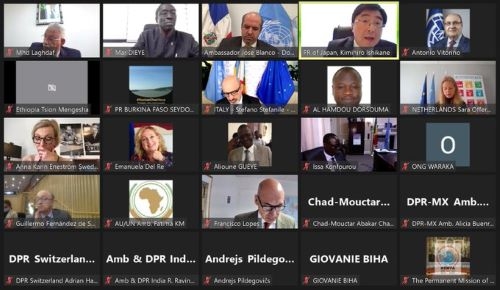サヘル地域における気候関連の平和・開発の課題に関する平和構築委員会(PBC)大使級会合における石兼大使ステートメント
令和4年3月22日

Mr. Chair,
Thank you for convening this thematic meeting. I would also like to thank all the briefers.
The PBC was established precisely “to bring together all relevant actors to marshal resources and to advise on and propose integrated strategies” to build and sustain peace. This thematic meeting itself can serve as a platform to identify concrete cases of the climate-conflict nexus, including the financing aspect, and can guide us in crafting the strategic action-oriented plan.
We have all witnessed progress towards peace and sustainable development in the Sahel region during the past years. Yet we also have to admit that urgent restoration and strengthening of good governance in the region is required in the face of political instability, violent conflict, and the serious security and humanitarian threats, including those exacerbated by climate change. These challenges are even more complex as the region and the world seek to build back better from the pandemic.
Good governance is the prerequisite for improving the security situation, recovering from disaster aftermath, and alleviating poverty. Consolidation of democratic institutions will play a key role in bringing sustainable peace and stability to the people of the Sahel region. Building effective, accountable, transparent, and inclusive institutions is essential to address the root causes of conflict and human insecurity.
With the aim to advance concrete actions, Japan developed the “New Approach for Peace and Stability in Africa (NAPSA)” at TICAD7. In order to address security challenges including those related to climate change, institution-building, and strengthening of governance and local community resilience are important. Japan contributes to strengthening national and local institutions under the banner of NAPSA. As a latest example, Japan decided to contribute around 6.3 million USD this year for the stabilization of Liptako-Gourma Region, through livelihood support and job creation, in partnership with UNDP. Ahead of TICAD 8 in August, Japan renews its commitment to further assisting in the consolidation of institutions and the strengthening of governance in the Sahel region.
I believe that cooperation among international stakeholders can create synergies and maximize our collective effort. Just as the third ministerial meeting of the Coalition for the Sahel was held earlier this month, it is my great hope that this PBC meeting will serve as another step for further cooperation in the Sahel region.
To conclude, let me reassure you of Japan’s continued engagement.
I thank you.
